Sensational Sussex miscarriage of justice – the true story behind Wicked Little Letters film
and live on Freeview channel 276
Those who don't know the background to the Littlehampton Libels may be forgiven for leaving the cinema thinking poor Rose Gooding spent only a short time in a cell but the harsh truth is that she was sent to prison not once but twice, despite being completely innocent.
The drama took place over a period of three years, from May 1920 to July 1923. The Worthing Herald reported it at the time as a 'remarkable instance of a miscarriage of justice' and made it clear it had been a 'cruel ordeal' for Rose.
Advertisement
Hide AdAdvertisement
Hide AdThere was widespread press attention and the Herald reported a sensation was caused throughout the whole country by the Court of Criminal Appeal finally quashed Rose's convictions.
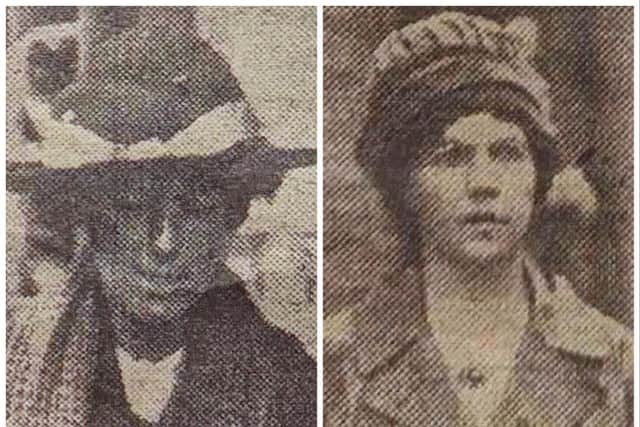

True Sussex story behind Olivia Colman's new film Wicked Little Letters told at Littlehampton Museum
As the film makes clear, and Olivia Colman emphasises so brilliantly, no one knows to this day why Littlehampton laundress Edith Swan did it – why she wrote so many obscene letters, why she led a determined campaign to frame Rose, and why she continued to deny it all despite absolutely concrete evidence.
Even at Edith's trial at the Sussex Assizes at Lewes in July 1923, after Mr Justice Avery passed sentence, Edith said: "You are sentencing an innocent woman."
Advertisement
Hide AdAdvertisement
Hide AdLet us go back to the very beginning. Rose Gooding, played by Jessie Buckley, moved in to 45 Western Road with her husband Bill and children Dorothy and William just before Christmas 1918. The rented property was at the end of a passageway, next door to the Swan family.
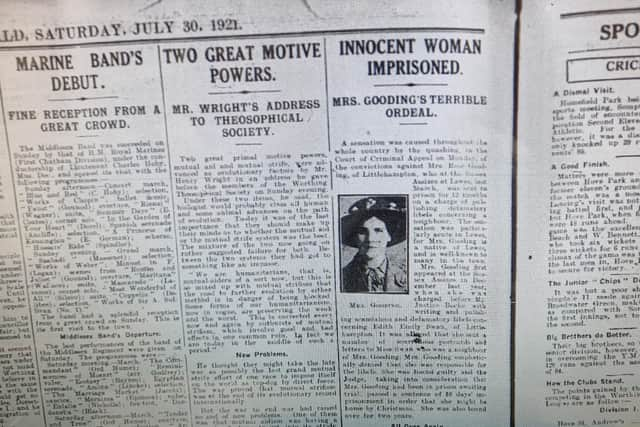

Edith Swan, played by Olivia Colman, was the youngest of nine children. She lived with her parents, Edward and Mary Ann, and two brothers at 47 Western Road.
We know the women got on well at first, as at Rose's first trial at Lewes in December 1920, Edith said they had been on friendly terms for nearly two years. The friendship ceased in May 1920, Edith said, after she reported Rose to the RSPCC (Royal Society of Prevention of Cruelty to Children) for ill-treating her sister's baby.
Edith appointed the solicitor Arthur Shelley and arranged a private prosecution for publishing defamatory libels. The case began with Rose being summoned to Littlehampton County Bench for criminally libelling Edith, who said she had received a postcard and the statement on it was untrue.
Advertisement
Hide AdAdvertisement
Hide Ad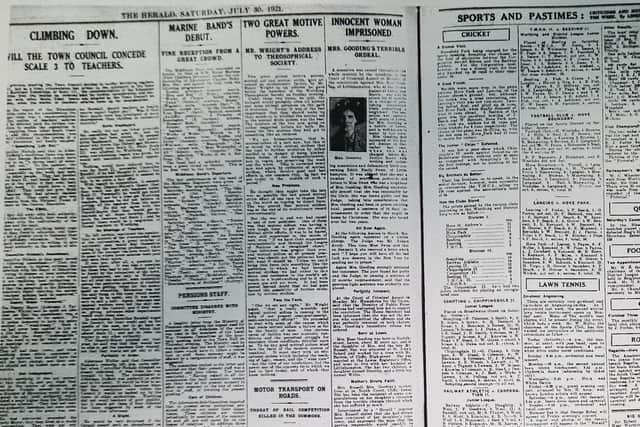

The case was reported in the Bognor Regis Observer in September 1920 with the headline 'ALLEGED CRIMINAL LIBEL'. Edith said she received a letter dated May 14 that was signed 'R' and sent by post, unpaid. It contained the words: "Mind your own business and there will be no rows."
Rose was committed for trial at Lewes and held in custody as she did not have the funds for bail. Interestingly, at the Sussex Assizes, His Lordship said he did not know why there were no ladies on the jury to try the case.
Littlehampton postmaster Thomas Doulton told the court the content of the letter was 'indecent'. Rose was found guilty and sentenced to 14 days' imprisonment, though she had already spent 12 weeks in custody.
Advertisement
Hide AdAdvertisement
Hide AdAbusive letters were being sent to all sorts of people, including Edith, almost from the moment Rose was released. So, just a few weeks later, Edith applied for a second private prosecution and on February 15, 1921, Rose was arrested again and committed for trial.
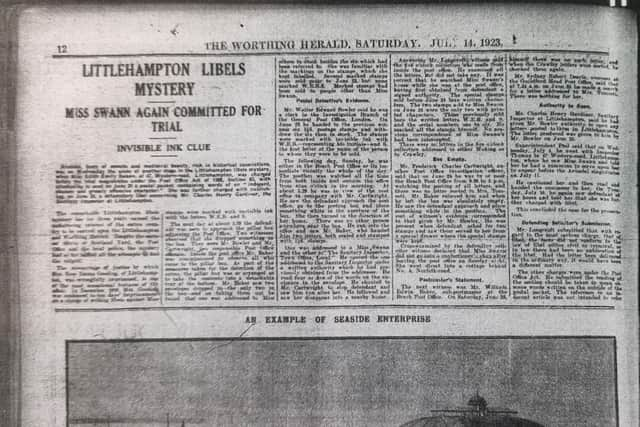

She appeared at Lewes on March 3, 1921, and was found guilty for a second time. This time she was told she would be in prison for 12 months.
Fortunately for her, justice was to prevail. The Home Office intervened and a full police enquiry began.
In July 1921, the Scotland Yard investigation had Rose’s second conviction quashed, resulting in her immediate release and an award of £250 in compensation for being wrongly accused. Her prosecution was branded a 'miscarriage of justice' by the press.
Advertisement
Hide AdAdvertisement
Hide AdIn the Worthing Herald on Saturday, July 30, 1921, the headline screamed 'INNOCENT WOMAN IMPRISONED' and the report highlighted Rose's 'terrible ordeal'.
A sensation was caused throughout the whole country by the Court of Criminal Appeal quashing the convictions, the Herald reported.
Rose had been tried twice at Lewes Assizes for libel and received prison sentences of 14 days and 12 months. She was said to have received 'two perfectly fair trials' and had unsuccessfully appealed against one conviction.
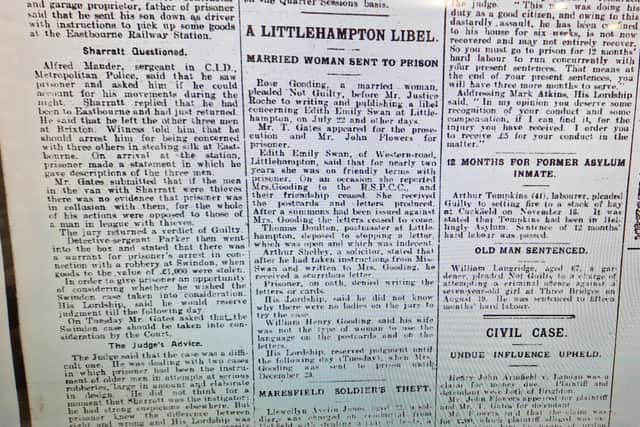

But the Home Secretary referred the case to the court after Inspector Nichols from Scotland Yard ascertained that she was innocent. It was, in fact, impossible that she could have committed the offences for which she had been convicted and sentenced, he found.
Advertisement
Hide AdAdvertisement
Hide AdLetters and postcards continued to be sent and the police were able to identify Edith as the likely suspect. She appeared in court in October 1921, charged with libelling Violet May on September 27, 1921, but at the trial in December, she was acquitted.
It was thought that the jury did not believe such a respectable woman could be responsible for such language.
So, the detailed investigations continued, including using invisible ink on specially-prepared stamps and WPC Gladys Moss keeping a watch from a nearby shed, and finally there could be no question that it was Edith who was sending the letters.
It was described in the press as 'a sensational sequel' to the Gooding case. Yet, despite all the evidence, Edith continued to deny that it was her, even though she had been seen posting the letters.
Advertisement
Hide AdAdvertisement
Hide AdIn July 1923, 32-year-old Edith appeared at the Arundel Bench facing two charges, sending or attempting to send a postal packet which had words of an indecent, obscene and gravely offensive character and publishing a defamatory libel on Littlehampton sanitary inspector Charles Gardner, both on June 24, 1923, at the same time.
She was committed for trial at Lewes and the case attracted huge attention. It was described as the climax to a campaign of scurrilous letters over a long period of time. The trial began on the afternoon of Wednesday, July 18, 1923, and concluded just before 1.30pm on Thursday, July 19, 1923.
Edith pleaded not guilty in an 'emplastic' voice, it was reported in the Worthing Herald. She preserved a calm demeanour throughout and spoke in a low, clear voice.
Inspector Thomas said in court that when he read the charge to her, Edith replied: "All I can say is it is quite untrue."
Advertisement
Hide AdAdvertisement
Hide AdThree times during cross examination, she was told she was 'properly trapped' and 'it was useless for her to deny it' but she continued to say it was not her. Asked if she used words such as in the letter, she said 'never in my whole life'.
Six stamps provided by Mr Bowler from the GPO had been placed in a special drawer at the Beach Sub Post Office in Norfolk Road, Littlehampton. They had been labelled to be sold to Edith and two were purchased by her. Other marked stamps were labelled showing to whom they were to be sold.
She was then caught in the act of posting two letters which bore the specially-prepared stamps. When the jury retired, it took them only about a quarter of an hour to return a guilty verdict and Edith was sentenced to 12 months in prison.
His Lordship said: "Edith Emily Swan, it is difficult to believe, after listening to you in the witness box, that you can be in your right mind in writing filth of this description."
Advertisement
Hide AdAdvertisement
Hide AdEven then, it was not over, as Edith attempted an appeal in August but the Court of Criminal Appeal refused her application.
Edith died in March 1959 in North View Home, East Preston, a residential home run by West Sussex County Council. Rose and Bill stayed in Littlehampton, though they moved to the centre of town. Rose died in East Sussex in December 1968 at the age of 79.